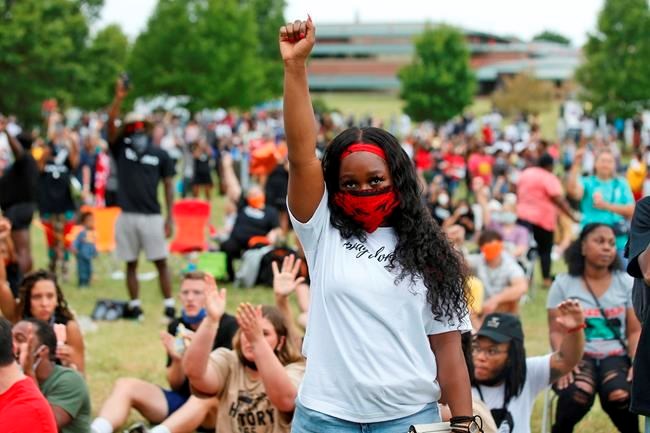TULSA, Okla. — In the city that bore witness to the Black Wall Street massacre of 1921, the twin epicentres of America's seismic shift on justice, race and social disparity find themselves just a 30-minute walk apart.
Black Lives Matter protesters, their momentum unabated after nearly a month since the police killing of George Floyd in Minneapolis, are planning to gather today in downtown Tulsa to demand an end to the systemic, institutional repression of people of colour.
Not far away, Donald Trump will be heralding his return to the presidential campaign trail with his first "Keep America Great" rally in nearly four months — an indoor affair at a 20,000-seat downtown arena, despite the ever-present threat of the novel coronavirus.
The twin perils of COVID-19 indoors and race-fuelled violence outside will make it hard to know where to stand.
"I would not do an indoor rally, but the president thinks that he's above all of that," Rev. Al Sharpton said Friday as he arrived at a Juneteenth rally in the city's historic Greenwood district, the site of the violent clash 99 years ago that's also known as the Tulsa race massacre.
"I come to Tulsa to deal with an issue. (Trump) should come to Tulsa to deal with the issue of what is going to deal with the real racial history, and then healing, in America. He has addressed everything but how to deal with the racial gap in this country."
Indeed, the president's rally was initially scheduled on the same day as Juneteenth, the annual commemoration of June 19, 1865, when slaves in Texas were told that slavery had been abolished — two and a half years after the fact.
Trump told the Wall Street Journal that he changed his mind on the advice of one of his Secret Service agents — then promptly took credit for giving the occasion some badly needed publicity.
"I did something good; I made Juneteenth very famous," Trump told the newspaper. "It's actually an important event, an important time. But nobody had ever heard of it."
For someone who grew up in racially diverse New York City, the president is either lying or woefully ignorant of Black history, Sharpton said.
"When was America great?" he asked. "Was it great when we took two and a half years to tell people in Texas that they were free? Was it great when white women couldn't even vote until 1920?"
"It was great for white men with property, but it wasn't even great for their wives. It wasn't great for Blacks and Indigenous Americans, it wasn't great for those that were immigrants."
As hard as it might be for some to believe that a sitting U.S. president was oblivious to the historical significance of June 19, it's less hard in the case of this one, said Quraysh Ali Lansana, a poet and teaching artist at the Tulsa campus of Oklahoma State University.
"I think his team knew, and I think it was strategy for them," Lansana said.
"It's tone deaf and insensitive, but it's strategy. But I don't think he knows much of anything. So no, I really don't think that he knew what Juneteenth was until the pushback he got."
If nothing else, it has trained the world's gaze on this city in the northwest corner of Oklahoma, in the foothills of the Ozark Mountains, and kindled public interest both in Juneteenth and the Tulsa massacre, both of which spiked a hundredfold in Google searches last week.
Interest in COVID-19 was tepid by comparison — although with several states showing alarming spikes in their active caseloads, that could be about to change.
The Oklahoma Supreme Court on Friday rejected a request to require everyone attending Trump's rally to wear a face mask and stay at least six feet apart from everyone else in the arena.
And on Saturday, the city lifted its curfew, imposed amid fears of a resurgence of the looting and vandalism that marred the early days of the protests, after Trump said he'd spoken with the mayor.
This report by The Canadian Press was first published June 20, 2020.
— Follow James McCarten on Twitter @CdnPressStyle
James McCarten, The Canadian Press



